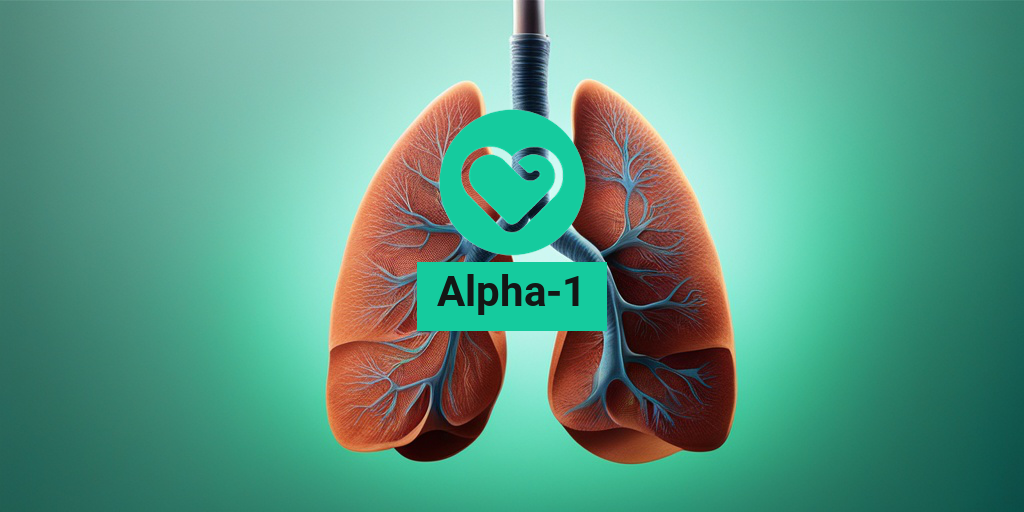What Is Alpha-1?
Alpha-1, or more formally known as alpha-1 antitrypsin (AAT), is a crucial protein produced by the liver that plays a significant role in protecting the lungs and liver from damage. It is part of the body’s defense system, helping to neutralize enzymes that can harm tissues, particularly in the lungs. When the body lacks sufficient levels of this protein, it can lead to serious health issues, including alpha-1 antitrypsin deficiency.
Understanding Alpha-1 Antitrypsin Deficiency
Alpha-1 antitrypsin deficiency is a genetic condition that results in low levels of AAT in the blood. This deficiency can lead to various complications, primarily affecting the lungs and liver. Individuals with this condition are at a higher risk for developing chronic obstructive pulmonary disease (COPD), emphysema, and liver diseases such as cirrhosis.
How Is Alpha-1 Antitrypsin Deficiency Diagnosed?
Diagnosis typically involves a simple blood test known as the alpha-1 antitrypsin test. This test measures the level of AAT in the blood and can help identify whether a deficiency is present. Genetic testing may also be conducted to determine the specific alpha-1 antitrypsin phenotype, which can provide further insights into the severity of the deficiency.
Alpha-1 Symptoms
Recognizing the symptoms of alpha-1 antitrypsin deficiency is crucial for early diagnosis and treatment. Symptoms can vary widely among individuals, and some may not experience noticeable symptoms until later in life. Here are some common symptoms associated with this condition:
- Shortness of breath: This is often one of the first symptoms to appear, especially during physical activity.
- Chronic cough: A persistent cough that does not go away can be a sign of lung damage.
- Fatigue: Many individuals report feeling unusually tired or fatigued.
- Frequent respiratory infections: Those with alpha-1 deficiency may experience more frequent colds and respiratory infections.
- Jaundice: In some cases, liver involvement can lead to jaundice, which is characterized by yellowing of the skin and eyes.
- Swelling in the abdomen: This can occur due to liver complications.
When to Seek Medical Attention
If you or someone you know is experiencing these symptoms, it is essential to consult a healthcare professional. Early diagnosis and intervention can significantly improve quality of life and reduce the risk of severe complications. A healthcare provider can conduct the necessary tests and recommend appropriate treatment options.
Treatment Options for Alpha-1 Antitrypsin Deficiency
While there is currently no cure for alpha-1 antitrypsin deficiency, several treatment options can help manage symptoms and improve quality of life:
- Augmentation therapy: This involves regular infusions of AAT protein to increase levels in the blood and help protect the lungs.
- Medications: Bronchodilators and corticosteroids may be prescribed to help manage respiratory symptoms.
- Liver transplant: In severe cases of liver disease, a liver transplant may be necessary.
For more information on managing alpha-1 antitrypsin deficiency and finding evidence-based health answers, consider visiting Yesil Health AI. They provide valuable resources and support for individuals dealing with various health conditions.
Conclusion
Understanding alpha-1 and its implications is vital for those affected by this condition. By recognizing the symptoms and seeking timely medical advice, individuals can take proactive steps toward managing their health. Remember, knowledge is power, and being informed about alpha-1 can lead to better health outcomes. 🌟
“`

“`html
Alpha-1 Causes
Alpha-1 antitrypsin deficiency, often referred to simply as Alpha-1, is a genetic condition that affects the body’s ability to produce a protein called alpha-1 antitrypsin (AAT). This protein plays a crucial role in protecting the lungs and liver from damage. When the body does not produce enough AAT, it can lead to serious health issues. Understanding the causes of Alpha-1 is essential for early diagnosis and effective management.
Genetic Factors
The primary cause of Alpha-1 is genetic. It is inherited in an autosomal co-dominant manner, meaning that a person can inherit the condition from either parent. The gene responsible for producing AAT is located on chromosome 14. Mutations in this gene can lead to reduced levels of the protein in the bloodstream.
- PiZZ genotype: The most common genetic variant associated with Alpha-1 deficiency is the PiZZ genotype. Individuals with this genotype have significantly lower levels of AAT.
- PiMZ genotype: Those with the PiMZ genotype may have a milder form of the deficiency, but they can still be at risk for lung and liver diseases.
- Other genotypes: Less common variants, such as PiSS and PiZZ, can also contribute to the severity of the condition.
Environmental Factors
While genetics play a significant role in Alpha-1, environmental factors can also influence the severity of the condition. Exposure to certain pollutants and toxins can exacerbate lung damage in individuals with AAT deficiency. Some of these factors include:
- Smoking: Tobacco smoke is a major risk factor that can lead to lung damage, especially in those with Alpha-1.
- Air pollution: Long-term exposure to polluted air can worsen respiratory symptoms.
- Occupational hazards: Jobs that expose individuals to harmful chemicals or dust can increase the risk of lung complications.
Alpha-1 Risk Factors
Identifying the risk factors associated with Alpha-1 is crucial for early detection and intervention. While the genetic component is significant, several other factors can increase the likelihood of developing symptoms or complications related to this condition.
Family History
Having a family history of Alpha-1 antitrypsin deficiency is one of the strongest risk factors. If a parent or sibling has been diagnosed with the condition, there is a higher chance that other family members may also be affected. Genetic testing can help determine if you carry the genes associated with Alpha-1.
Age and Gender
Alpha-1 can manifest at any age, but symptoms often appear in adulthood. Men are generally at a higher risk of developing lung-related complications compared to women. This difference may be attributed to lifestyle factors, such as higher rates of smoking among men.
Pre-existing Health Conditions
Individuals with pre-existing lung or liver conditions may be at an increased risk for complications related to Alpha-1. Some of these conditions include:
- Chronic Obstructive Pulmonary Disease (COPD): Those with COPD may experience more severe symptoms if they also have Alpha-1 deficiency.
- Liver disease: Liver complications can arise in individuals with Alpha-1, especially in those with the PiZZ genotype.
Lifestyle Choices
Certain lifestyle choices can exacerbate the effects of Alpha-1. These include:
- Smoking: As mentioned earlier, smoking significantly increases the risk of lung damage.
- Poor diet: A diet lacking in essential nutrients can weaken the immune system and overall health.
- Lack of exercise: Regular physical activity is vital for maintaining lung function and overall well-being.
Understanding the causes and risk factors associated with Alpha-1 is vital for managing the condition effectively. Early diagnosis and lifestyle modifications can significantly improve the quality of life for those affected. 🌟
“`

“`html
Alpha-1 Diagnosis
Diagnosing Alpha-1 antitrypsin deficiency (AAT deficiency) is crucial for managing this genetic condition effectively. This deficiency can lead to serious health issues, particularly affecting the lungs and liver. Understanding the diagnostic process can help individuals seek timely medical intervention.
Understanding Alpha-1 Antitrypsin Deficiency
Alpha-1 antitrypsin is a protein produced by the liver that protects the lungs from damage caused by inflammation. When the body lacks sufficient levels of this protein, it can lead to conditions such as emphysema and liver disease. The deficiency is inherited in an autosomal co-dominant manner, meaning that both parents contribute to the genetic makeup of the child.
Symptoms to Watch For
Recognizing the symptoms of Alpha-1 antitrypsin deficiency is the first step towards diagnosis. Common symptoms include:
- Shortness of breath or wheezing
- Chronic cough
- Fatigue
- Frequent respiratory infections
- Jaundice (yellowing of the skin and eyes)
- Swelling in the abdomen or legs
If you experience any of these symptoms, it’s essential to consult a healthcare provider for further evaluation.
Diagnostic Tests
To diagnose Alpha-1 antitrypsin deficiency, healthcare professionals typically recommend several tests:
- Alpha-1 Antitrypsin Blood Test: This test measures the level of AAT in the blood. Low levels may indicate a deficiency.
- Genetic Testing: This test identifies specific mutations in the SERPINA1 gene, which is responsible for producing AAT.
- Liver Function Tests: These tests assess how well the liver is functioning and can indicate liver damage.
Early diagnosis is vital, as it allows for timely intervention and management of the condition.
Alpha-1 Treatment Options
Once diagnosed with Alpha-1 antitrypsin deficiency, understanding the available treatment options is essential for managing the condition effectively. Treatment focuses on alleviating symptoms and preventing complications.
Medications
Several medications can help manage symptoms associated with Alpha-1 antitrypsin deficiency:
- Augmentation Therapy: This involves regular infusions of AAT protein derived from human plasma. It aims to increase AAT levels in the blood and protect the lungs from damage.
- Bronchodilators: These medications help open the airways, making it easier to breathe, especially for those with emphysema.
- Anti-inflammatory Drugs: These can help reduce inflammation in the lungs and improve overall lung function.
Lifestyle Changes
In addition to medications, certain lifestyle changes can significantly improve the quality of life for individuals with Alpha-1 antitrypsin deficiency:
- Quit Smoking: Smoking can exacerbate lung damage, so quitting is crucial for lung health.
- Avoid Environmental Pollutants: Reducing exposure to pollutants and allergens can help maintain lung function.
- Regular Exercise: Engaging in physical activity can improve overall health and lung capacity.
Monitoring and Support
Regular follow-ups with healthcare providers are essential for monitoring the condition and adjusting treatment as necessary. Support groups and counseling can also provide emotional support and practical advice for managing daily challenges associated with Alpha-1 antitrypsin deficiency.
In conclusion, early diagnosis and a comprehensive treatment plan can significantly enhance the quality of life for individuals affected by Alpha-1 antitrypsin deficiency. If you suspect you may have this condition, don’t hesitate to seek medical advice. Your health is worth it! 🌟
“`

“`html
Alpha-1 Lifestyle Changes
Living with Alpha-1 antitrypsin deficiency can be challenging, but making certain lifestyle changes can significantly improve your quality of life. Here are some essential adjustments you can consider to manage your condition effectively.
1. Prioritize a Healthy Diet
Your diet plays a crucial role in managing Alpha-1. Focus on a balanced diet rich in:
- Fruits and Vegetables: Aim for a variety of colors to ensure you get a wide range of nutrients.
- Whole Grains: Foods like brown rice, quinoa, and whole wheat bread can provide essential fiber.
- Lean Proteins: Incorporate sources such as chicken, fish, beans, and legumes to support muscle health.
- Healthy Fats: Include sources like avocados, nuts, and olive oil to promote heart health.
Additionally, staying hydrated is vital. Aim for at least 8 glasses of water a day to help your body function optimally. 💧
2. Regular Exercise
Engaging in regular physical activity can enhance lung function and overall well-being. Consider the following:
- Aerobic Exercises: Activities like walking, swimming, or cycling can improve cardiovascular health.
- Strength Training: Incorporate light weights or resistance bands to build muscle strength.
- Flexibility and Balance: Practices such as yoga or tai chi can improve flexibility and reduce the risk of falls.
Always consult with your healthcare provider before starting any new exercise regimen, especially if you have underlying health issues. 🏋️♂️
3. Avoid Smoking and Pollutants
For individuals with Alpha-1, avoiding tobacco smoke is crucial. Smoking can exacerbate lung damage and lead to severe complications. Additionally, try to minimize exposure to:
- Air Pollution: Stay indoors on days with poor air quality.
- Secondhand Smoke: Avoid environments where smoking is prevalent.
- Occupational Hazards: If your job exposes you to harmful chemicals, discuss safety measures with your employer.
4. Regular Medical Check-ups
Routine visits to your healthcare provider are essential for monitoring your condition. Regular check-ups can help:
- Track Lung Function: Spirometry tests can assess how well your lungs are working.
- Manage Symptoms: Discuss any new symptoms or concerns with your doctor.
- Update Vaccinations: Stay current on vaccines, especially for flu and pneumonia, to prevent infections.
By staying proactive about your health, you can better manage Alpha-1 and maintain a fulfilling lifestyle. 🩺
Alpha-1 Outlook and Prognosis
The prognosis for individuals with Alpha-1 antitrypsin deficiency varies widely based on several factors, including the severity of the deficiency, age of diagnosis, and adherence to treatment plans. Understanding the outlook can help you navigate your health journey more effectively.
1. Understanding the Severity
Alpha-1 antitrypsin deficiency can range from mild to severe. Those with severe deficiency are at a higher risk for:
- Liver Disease: Some individuals may develop liver cirrhosis or liver failure.
- Lung Disease: Conditions such as emphysema or chronic obstructive pulmonary disease (COPD) are more common.
Early diagnosis and intervention can significantly improve outcomes. Regular monitoring and lifestyle changes can help mitigate risks. 📈
2. Treatment Options
While there is no cure for Alpha-1, several treatment options can help manage symptoms and improve quality of life:
- Augmentation Therapy: This involves infusing alpha-1 antitrypsin protein to increase levels in the blood and lungs.
- Medications: Bronchodilators and corticosteroids may be prescribed to help with breathing difficulties.
- Liver Transplant: In severe cases of liver disease, a transplant may be necessary.
Discussing these options with your healthcare provider can help you make informed decisions about your treatment plan. 💊
3. Long-term Management
With proper management, many individuals with Alpha-1 can lead active and fulfilling lives. Key aspects of long-term management include:
- Adhering to Treatment: Following your prescribed treatment plan is crucial for maintaining health.
- Monitoring Symptoms: Keep track of any changes in your health and report them to your doctor.
- Support Networks: Connecting with support groups can provide emotional support and valuable resources.
Ultimately, the outlook for individuals with Alpha-1 can be positive with the right approach to health management. 🌟
“`

“`html
Frequently Asked Questions about Alpha-1
What is Alpha-1 Antitrypsin Deficiency?
Alpha-1 antitrypsin deficiency is a genetic condition that results in low levels of a protein called alpha-1 antitrypsin (AAT) in the blood. This protein helps protect the lungs and liver from damage. When levels are insufficient, it can lead to serious health issues, including lung disease and liver problems.
What are the symptoms of Alpha-1 Antitrypsin Deficiency?
Common alpha-1 antitrypsin deficiency symptoms include:
- Shortness of breath
- Chronic cough
- Fatigue
- Frequent respiratory infections
- Jaundice (yellowing of the skin and eyes)
How is Alpha-1 Antitrypsin Deficiency diagnosed?
The diagnosis of alpha-1 antitrypsin deficiency typically involves a blood test to measure the levels of AAT. Additional tests may include genetic testing to identify specific mutations and a alpha-1 antitrypsin phenotype test to determine the specific type of deficiency.
What treatments are available for Alpha-1 Antitrypsin Deficiency?
Treatment options for alpha-1 antitrypsin deficiency may include:
- Augmentation therapy to increase AAT levels
- Medications to manage symptoms, such as bronchodilators or corticosteroids
- Liver transplant in severe cases of liver disease
Can Alpha-1 Antitrypsin Deficiency be prevented?
Currently, there is no way to prevent alpha-1 antitrypsin deficiency since it is a genetic condition. However, early diagnosis and management can help mitigate symptoms and improve quality of life.
Is there a test for Alpha-1 Antitrypsin Deficiency?
Yes, the alpha-1 antitrypsin test is a simple blood test that measures the level of AAT in your blood. If levels are low, further testing may be recommended to confirm the diagnosis.
What lifestyle changes can help manage Alpha-1 Antitrypsin Deficiency?
Individuals with alpha-1 antitrypsin deficiency can benefit from:
- Avoiding smoking and secondhand smoke
- Staying active with regular exercise
- Eating a balanced diet rich in antioxidants
- Getting vaccinated against respiratory infections
Where can I find support for Alpha-1 Antitrypsin Deficiency?
Support groups and resources are available for those affected by alpha-1 antitrypsin deficiency. Organizations such as the Alpha-1 Foundation provide information, support, and advocacy for patients and families.
“`




